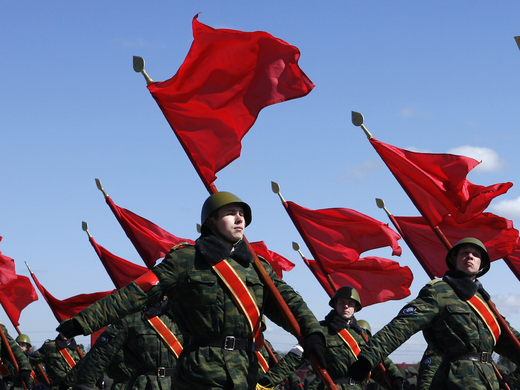Another jurisdiction marshalled its resources in preparation for war this week, as verbal volleys were exchanged and tensions increased in the ongoing dispute that is drawing more and more countries into potential conflict.
No, this is not a description of those dreadful days of late July 1914, when European powers mobilized their armies in what would become an example of Barbara Tuchman's "March of Folly." It is, rather, a (somewhat fanciful) description of recent developments in international monetary policy.
Concerns of an imminent "currency war" have simmered ever since Brazil's finance minister Guido Mantega raised the alarm over the use of quantitative easing by the U.S. Federal Reserve and the Bank of England. The risk of hostilities increased with the Swiss National Bank's decision to put a ceiling on the appreciation of the Swiss franc. Another belligerent entered the fray in December following the election in Japan of a new government with clear views on how the Bank of Japan has conducted monetary policy —too timidly, too constrained by the orthodoxy of the prevailing wisdom. And this week the European Central Bank (ECB) rolled out its big gun to halt the recent appreciation of the euro.
The mobilization of "Super Mario" —ECB President Mario Draghi —to talk down the euro represents a new and potentially more dangerous phase in the currency war. To be sure, thus far it has been pretty much a phony war, analogous to the inactivity in Europe between the fall of Poland and the battle of France in 1939–1940. Moreover, it is slightly ironic that Draghi has had to intervene. After all, it was his successful handling of the deepening euro crisis last summer, through his "European Vacation Put" and subsequent announcement of Out-Right Monetarty Transactions, that rescued Europe from a vortex of uncertainty and financial crisis that threatened to pull the whole of the continent down.
Yet, Draghi's decisive, determined actions to restore stability to the euro zone have also created a patina of calm that has pushed the euro higher against other currencies, many of which are wobbling under the influence of quantitative easing. This strength has created new challenges —both for the euro zone and for the rest of the world.
Germany, long the advocate of policy orthodoxy, has begun to feel the effect of the fiscal austerity and economic collapse in other members of the euro zone. To this point, its growth has held up remarkably well, as it has exported its engineering and capital goods to the rest of the world. In this respect, the protracted crises in Greece, Portugal and Spain had the unintended, but welcomed effect of keeping the euro low. Combine world-leading technology and a competitive currency, it is not surprising that German growth has held up. But, with the euro —the sick man of Europe, to be sure —out of immediate threat of an untimely demise, and the rest of the world in a synchronized slowing through 2012, German order books may not be as full as they once were. With Chancellor Merkel facing elections later this year and the rest of the euro zone stagnating, the risks ahead are clear.
The question is whether merely rolling out Super Mario is a sufficient threat to keep investors out of the euro. I think not. The old adage, "talk is cheap," applies, particularly in the context of the ongoing efforts by other central banks to reach self-sustaining growth, or "escape velocity" as Bank of Canada governor Mark Carney argued in his testimony to a Parliamentary Committee in London. So, it is likely that the ECB will have to do more if it wants to avoid the implicit tightening of monetary conditions associated with a stronger euro.
This could be a problem. Some German officials are already concerned that Mr. Draghi has pursued too expansionary a monetary path (it doesn't take a fecund imagination to think that, in private, Bundesbank officials have used the phrase "reckless and irresponsible"). Further action could well create an irreparable rift within the ECB's governing council and create a political problem of another kind for Mrs. Merkel. Hopefully, however, it would be seen as necessary to support growth in the core of the euro zone.
But more easing by the ECB could further aggravate the problems faced by emerging economies that have slowed as their currencies have appreciated in response to the quantitative easing adopted by many advanced economies. To limit this appreciation, many have introduced capital controls.
This is a short-term palliative that would not withstand the potential tidal wave of liquidity they could confront. The simple fact is that monetary policy in many advanced economies has resorted to extraordinary measures because fiscal policy has been neutralized by high debt burdens, political gridlock or concious policy choice. Efforts to block the real exchange rate adjustment, meanwhile, are unlikely to be successful.
In some respects, the dilemma emerging economies face is higher currencies or higher inflation (as capital controls become porous over time and ineffective). In some countries, the former option entails difficult decisions to re-balance growth from an export-led growth model to one based on domestic demand; elsewhere, it can accommodate a healthy increase in infrastructure investment to meet the needs of their growing populations. The latter option entails a growing risk of asset price bubbles and subsequent risk of financial collapse that emerging economies avoided.
There is, of course, another possibility. Countries could seek to avoid the costs of adjustment by erecting walls to block out not just capital, but also goods. We have seen this play out before; we know how it all ends. Unfortunately, like the mobilizations of July and August 1914, once it starts, it is very, very difficult to stop. As the British Foreign Secretary observed on the eve of war:
"The lamps are going out all over Europe. We shall not see them lit again in our time."
I hope that concerns of possible "currency wars" remain just ominous warnings and that the G20's efforts to secure strong, sustainable and balanced growth through cooperation succeed. In an integrated global economy facing important challenges of transition on global balances of power, it could be all the more difficult to re-light the lamps of international cooperation should they be extinguished.


